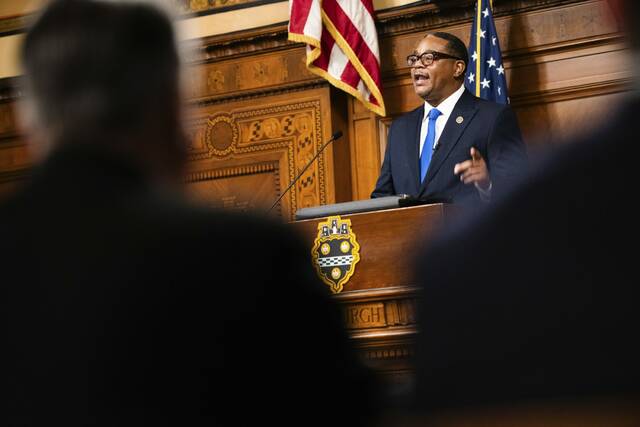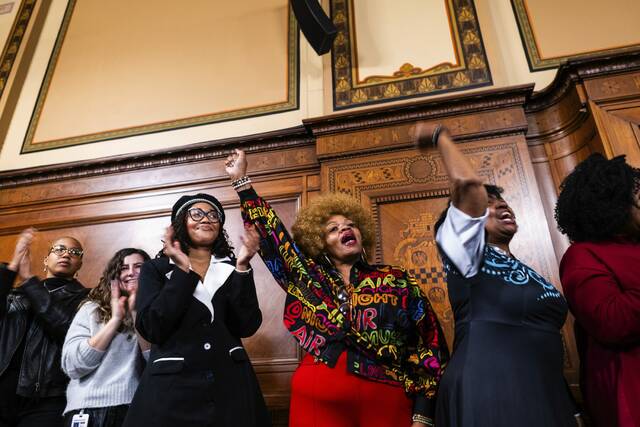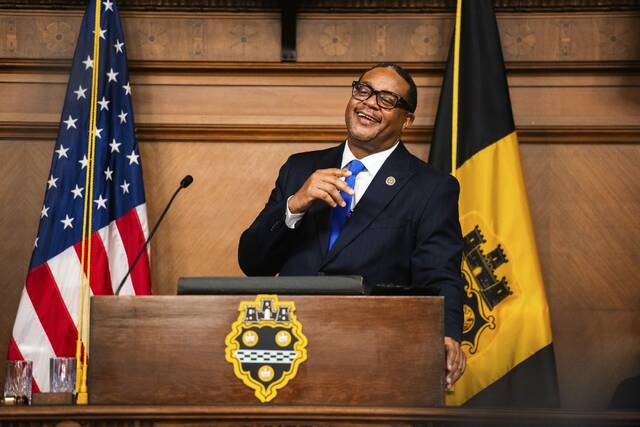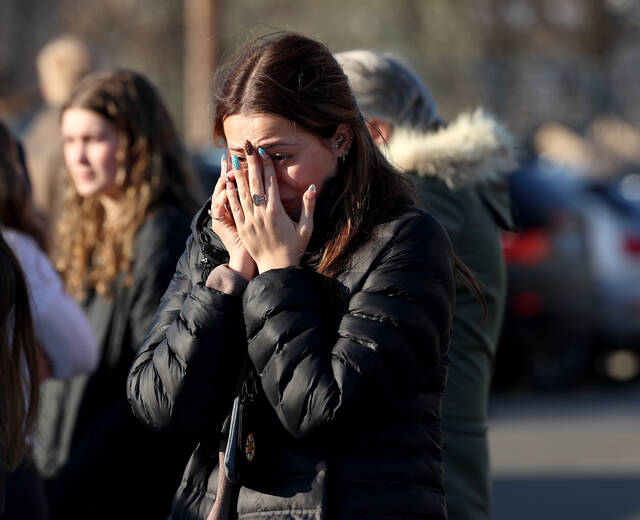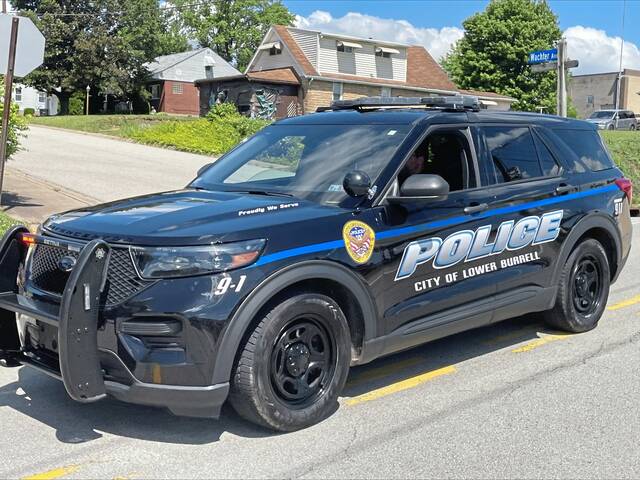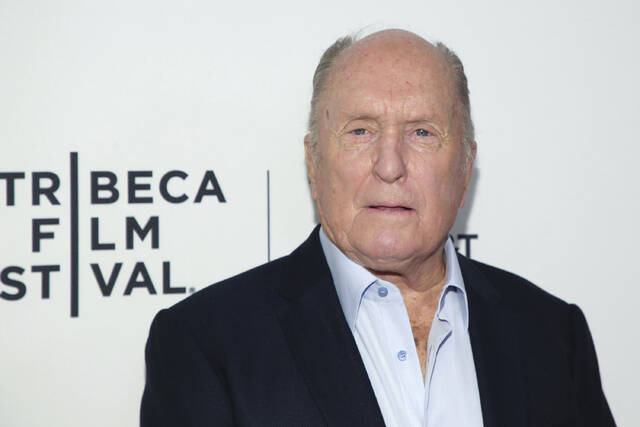Pittsburgh Mayor Ed Gainey during his annual budget address Monday said he believes he will leave the city “in a stronger position” as he prepares to leave office after losing his reelection bid.
“When I first stood in the chamber four years ago, we faced a choice — shrinking back into the comfortable habits of the past or do the harder work of reinvesting and reinventing a city that would work for everyone,” Gainey told a standing-room only crowd inside City Council chambers.
“We chose the harder path. We chose people over politics. We chose action over excuses. And because of those choices, our city is stronger, more fair and more resilient than when I walked into this office.”
Gainey’s preliminary budget proposal for next year has been met with skepticism by Controller Rachael Heisler and some councilmembers. Critics raised alarms the spending plan did not allocate enough for the city’s aging vehicle fleet, the number of firefighters now on staff or overtime costs for public safety — an area where the city is exceeding its budget this year.
Similarly, not everyone Monday was won over by Gainey’s nearly 90-minute speech focusing largely on his administration’s accomplishments.
Councilman Bob Charland, D-South Side, criticized the outgoing mayor for using the budget address to present his “swan song” before leaving City Hall rather than discussing the serious challenges facing the city.
“I would’ve much rather heard today about what we’re going to do to fix the holes in our fleet, our overtime, our landslides,” Charland said. “Instead, it was a lot of campaign rhetoric.”
Charland said he wants to see “more drastic changes” to the budget plan on the table.
But updated budgets released Monday were not substantively different from the $680 million operating and $100 million capital spending plans initially unveiled at the end of September.
The updated operating budget reflected about $2 million less in spending than the initial version.
Jake Pawlak, director of the Office of Management and Budget, described the modifications as “fairly minimal.”
He said they included restoring funding for six unfilled social worker positions and updating price estimates on some capital projects.
Pawlak dismissed concerns about overtime spending, arguing that exceeding the premium pay budget by nearly $20 million this year will be mitigated somewhat by lower spending on salary in other areas.
He said there would be “fluctuations” in the number of firefighters in response to questions about the budget planning for fewer firefighters than the city now employs.
But he did agree with critics that the city ought to spend more on its struggling vehicle fleet.
“We are continuing a trend of plugging away on that problem,” Pawlak said.
‘Preserve the progress’
This marks Gainey’s final budget address of his lone term.
“Together, we have shown that when we lead with heart, fairness and purpose, we can build a city that truly works for everyone,” Gainey said.
An enthusiastic room of Gainey staffers and supporters gave the mayor a standing ovation and chanted the mayor’s name when he entered council chambers to deliver his speech.
Mayor-elect Corey O’Connor — who defeated Gainey in the Democratic primary before securing a decisive victory in the general election this month — will inherit a 2026 budget that must be passed by the end of the year.
Gainey touted his budget proposal as one that uses “modest and targeted reductions in spending” to weather fiscal challenges without laying off workers, cutting core city services or raising taxes.
“My budget proposal for the coming year seeks to preserve the progress we’ve made over the last four years,” the outgoing mayor said.
Some officials, however, have questioned whether the mayor’s budget proposal is realistic. City Council last week held a meeting to discuss ways to increase revenues.
The city has seen revenues decline in recent years, driven by a delay in a countywide property tax reassessment and declining property values of commercial buildings Downtown since the covid-19 pandemic.
Real estate tax revenue is projected to continue decreasing.
The Pennsylvania Supreme Court also recently struck down a controversial tax on out-of-town professional athletes and performers. And the federal covid-19 relief funds that buoyed municipalities around the nation through the pandemic is drying up.
“Balancing the financial bottom line with the real-world impact of our decisions is no small feat,” Gainey said. “We did not shrink from the challenge.”
Highlight reel
Gainey also used the budget address to highlight what his administration has done over the last four years.
The Fern Hollow Bridge collapsed Jan. 28, 2022, in Frick Park shortly after Gainey took office. On Monday, he praised efforts to quickly rebuild the span, invest in bridge maintenance and close down bridges deemed to be unsafe.
“We have no open bridges in failing condition,” the mayor said.
Gainey has ordered bridges closed several times because of safety concerns.
The mayor also highlighted the expansion of the Office of Community Health and Safety during his tenure.
The office deploys social workers to respond to some 911 calls and to offer resources to homeless people. Under Gainey, the city partnered with Allegheny County to close most Downtown homeless encampments.
His speech touched also on the ongoing efforts to revitalize Downtown.
A $600 million plan, championed by Gov. Josh Shapiro, aims to bring nearly 1,000 mixed-income housing units to the Golden Triangle.
It also includes upgrades to Market Square and Point State Park and the creation of a new outdoor civic space called Arts Landing, all of which are set to be completed before the NFL Draft comes to the city next year.
“We have brought Downtown back from the brink and positioned it for a stable and successful future,” Gainey said.
The mayor noted progress made at the city’s land bank, ongoing efforts to reduce traffic fatalities and the launch of an in-house EMT training academy. He pointed to investments in affordable housing, efforts to ensure minority-owned businesses could secure contracts with the city and a proposal that would cut red tape for street vendors.
“The administration also tackled violence in the Black community through prevention and partnership,” Gainey said, crediting the Stop the Violence program for curbing violent crime.
Pittsburgh last year saw a decline in homicides, following national trends.
“Why this is so big to me — these are the lives saved, families kept intact, futures protected,” Gainey said. “While we have made great progress, we cannot stop here.”
The budget address kicks off a weekslong process that will include hearings with each city department and public participation. Council can amend the budget before voting on it.


